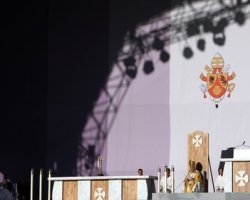Pope Benedict XVI has criticized his church for being "insufficiently vigilant" over child sex abuse allegations, in what amounts to his strongest criticism of the raging scandal so far.
As he flew to the UK for a historic visit on Thursday, he said that he was shocked by what he called "a perversion" of the priesthood.
"It is also a great sadness that the authority of the church was not sufficiently vigilant and not sufficiently quick and decisive in taking the necessary measures," Benedict said.
His visit, the first ever official state trip by a pontiff, has been marred by anger over revelations of decades of child abuse within the Catholic Church.
The comments of a close aide to the pope, who likened landing in Britain to arriving in a "Third World country", have also threatened to overshadow the trip.
Victims of abuse have dismissed the pontiff's comments, describing them as "hurtful, not helpful".
"It's disingenuous to say church officials have been slow and insufficiently vigilant in dealing with clergy sex crimes and cover ups," Joell Casteix of the US-based Survivors Network of those Abused by Priests (Snap) said.
"On the contrary, they've been prompt and vigilant, but in concealing, not preventing, these horrors."
Symbolic prayers
Benedict, who touched down in Edinburgh, Scotland, on Thursday morning, has been met by Queen Elizabeth II and is currently hosting an open-air mass later in Glasgow.
But the highlight of the four-day trip will be a beatification mass in Birmingham for a 19th century English cardinal, John Henry Newman.
It will also feature symbolic prayers with the Archbishop of Canterbury, Rowan Williams, the head of the world's Anglicans.
But the visit has come under fire from campaigners complaining that $18m of British taxpayers' money is being used to fund the state visit while the church is still under fire over its handling of clerical abuse cases across the world.
Margaret Kennedy of Ministry and Clergy Sexual Abuse Survivors said that victims would demonstrate as the pope travelled around the country.
"We have been refused three times access to the pope," she said.
"In other words, this visit means that the only way survivors can meet the pope is by protesting in the street."
Peter Saunders, the chief executive of the National Association for People Abused in Childhood, urged Benedict to do more to help the victims of clerical abuse and said that he hoped the issue would be addressed in the coming days.
"I would tell him that I was sick and tired of telling my story of abuse, because every time I tell it I relive some of it, but the reason I have to keep telling it is that we're not doing enough to support survivors of abuse and not doing enough to protect victims," said Saunders, who remains a Catholic despite being abused as a boy.
"And I would tell the Pope what it was actually like to be abused and how it left me feeling."
Other opponents of the visit, including human rights campaigners and secularists, are angry at the Vatican's stance on homosexuality, abortion and contraception, among other issues. They have organized a "Protest the Pope" march for Saturday.
'Hostility' acknowledged
The Catholic Church acknowledged that there was some "hostility" brushed off the planned protests.
"I think everywhere there are critics to the Catholic Church, to the proposals of church, but this is rather normal, and we are not surprised by this," Federico Lombardi, the Vatican spokesman, told Al Jazeera.
"I don't think that it's very wide or diffused hostility."
The Vatican has also sought to play down comments by Cardinal Walter Kasper, who recently retired from the Vatican's office in charge of relations with other Christian denominations, comparing the UK with a developing nation.
"Britain today is a secularized, pluralistic country. If you arrive at Heathrow airport, you sometimes think you had arrived in a Third World country," he reportedly told Germany's Focus magazine this week.
Lombardi said Kasper's comments were not intended as a slight, but simply reflected the cultural diversity instantly evident upon landing in London.
He intended to refer to "a cosmopolitan reality, a melting pot of ordinary humanity and all of its diversity and its problems", Lombardi said.
Kasper had been due to take part in the visit but pulled out last minute citing illness.
British apathy
Benedict's visit to the UK is the first by a pontiff since Pope John Paul II made a non-state pastoral visit in 1982. Benedict's visit has failed to excite the public imagination like that of his predecessor.
An Ipsos Mori poll conducted for the Catholic magazine The Tablet and published last week revealed widespread indifference among Britons, with 63 per cent neither in favor nor against the visit.
Disappointingly for organizers, this has been reflected in ticket sales for the planned masses. Only 55,000 people are expected at the main event in Birmingham which is able to host 80,000 worshippers.
Pilgrims have been asked to pay up to $39 to attend the masses as a contribution towards the cost of the visit.
PHOTO CAPTION
Pope Benedict XVI is seen on stage during his mass at Bellahouston Park, Glasgow, Scotland, Thursday Sept. 16, 2010.
Al-Jazeera


 Home
Home Discover Islam
Discover Islam Quran Recitations
Quran Recitations Lectures
Lectures
 Fatwa
Fatwa Articles
Articles Fiqh
Fiqh E-Books
E-Books Boys & Girls
Boys & Girls  Ramadan
Ramadan Fatwa Audios
Fatwa Audios Month of Mercy
Month of Mercy Women
Women Eed Al- Fitr
Eed Al- Fitr Food Recipes
Food Recipes Videos
Videos

 Prayer Times
Prayer Times












